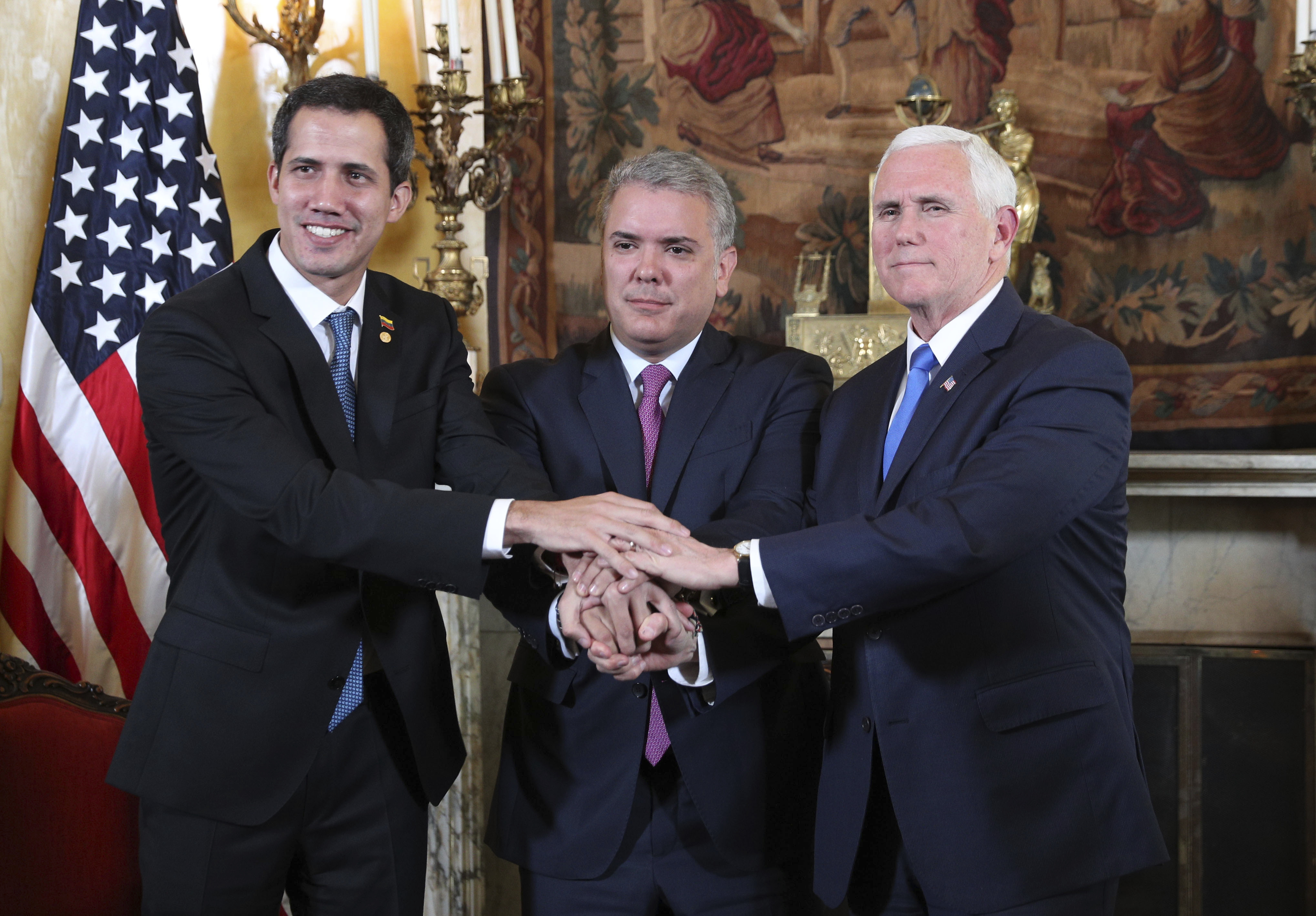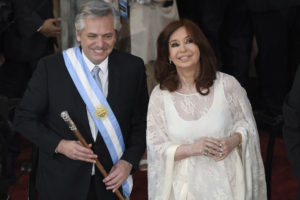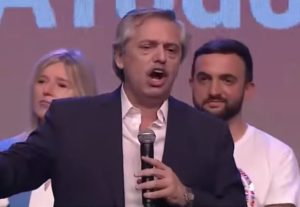Trump’s Venezuela Allies Have Credibility Issues of Their Own
Virtually every member of the United States' new "coalition of the willing" is politically or economically compromised. An expert explains. Venezuela's self-proclaimed Interim President Juan Guaido, Colombian President Ivan Duque and Vice President Mike Pence pose for a photo after a meeting of the Lima Group in Bogota, Colombia last month. (Martin Mejia / AP)
Venezuela's self-proclaimed Interim President Juan Guaido, Colombian President Ivan Duque and Vice President Mike Pence pose for a photo after a meeting of the Lima Group in Bogota, Colombia last month. (Martin Mejia / AP)
What follows is a conversation between co-director of the Center for Economic Policy Research Mark Weisbrot and Sharmini Peries of the Real News Network. Read a transcript of their conversation below or watch the video at the bottom of the post.
SHARMINI PERIES: It’s The Real News Network. I’m Sharmini Peries, coming to you from Baltimore.
A favorite talking point of those who support the Trump administration’s policies towards Venezuela is that 50 countries have recognized the opposition leader Juan Guaido as the interim president of Venezuela, and this includes countries like Canada and Europe. So people are very confused. When it is pointed out that 50 out of the 195 countries is only about 1/4 of the world’s countries, and less than 20 percent of the world’s population, the Trump administration argues that these are the world’s main democracies that support Guaido.
Part of the reason for assembling this coalition of countries that are willing to recognize the parallel government in Venezuela is to provide legitimacy to the Trump administration’s effort to oust Nicolas Maduro, the elected president of Venezuela. In some ways, this is similar to the coalition of the willing that President George W. Bush assembled to oust Saddam Hussein from Iraq. But who is this anti-Maduro coalition of the willing? And why are they supporting Trump?
Well, to discuss all of this with me today I’m joined by Mark Weisbrot. And he’s joining us from Washington, DC, where he is the co-director of the Center for Economic and Policy Research. Thanks for joining us, Mark.
MARK WEISBROT: Thanks for inviting me, Sharmini.
SHARMINI PERIES: All right. Mark, let’s start off with Trump’s main allies in this effort in Venezuela; particularly the Latin American allies, Colombia, Brazil, Argentina, Chile, Ecuador, Paraguay, among others. But most of these governments have their own issues of legitimacy, particularly Brazil. Tell us about some of them, and why are they allied with Trump, Bolton, Pompeo, Pence, and group?
MARK WEISBROT: Yes. Well, first I want to emphasize that even if these were the most wonderful governments in the world, there’s no legitimacy to the effort to overthrow the Venezuelan government. And that’s because, first of all, the sanctions that they’re using are illegal. They’re illegal under the Charter of the Organization of American States. They’re illegal under the Charter of the United Nations. And they are illegal under various conventions that these countries, and the United States in particular, have signed. So it wouldn’t be legitimate even if they had only the best countries, and even if they had a majority of countries. It’s just, it’s just illegal. And of course it’s immoral, because they’re using collective punishment against the population of Venezuela by depriving them of medicine and food and other essential goods.
But they still–they use this anyway. So it is kind of worth looking at the coalition. And as you said, why–you know, who is it, and why? So obviously you have some countries that have their own problems of legitimacy. The government of Brazil, which is headed by Jair Bolsonaro, he came to power in an election that was of questionable legitimacy because they excluded the most popular politician in Brazil, Lula da Silva, the former president. And they put him in jail so he couldn’t run. They also made a separate court decision that he couldn’t run from jail. But he was jailed and convicted without any real material evidence against him. It was all based on one plea bargain–the whole case was based on one plea bargain witness who was convicted of corruption. And his plea bargaining was cut off until he changed his story and supported the investigating, prosecuting judge’s view, what he wanted.
So that was very questionable. Then they prevented Lula from speaking to the media. And of course, they wouldn’t have even gotten rid of the Workers Party, Lula’s party, and had this opportunity if they hadn’t impeached Dilma Rousseff, the president from the Workers Party, in 2015 and ’16. They proceeded against her with an impeachment that didn’t actually have a real crime.
So all this was really unconstitutional, illegal. And that’s how Jair Bolsonaro, who’s most famous for his horrible remarks, you know, telling a fellow member of Congress, a woman, that he wouldn’t rape her because she didn’t merit it, and saying all these terrible racist and homophobic things, and glorifying violence. He once said that the Brazilian dictatorship should have killed 30,000 people instead of 3,000. And so this is the kind of president you have.
And so you have an ideological affinity with Trump. And you have also this question of legitimacy. Now, some of the other governments have both this ideological affinity with the U.S., and also owe them a lot. So you have the government of Colombia, and that’s a right-wing government headed by Ivan Duque. And he was picked by Alvaro Uribe, who was the previous president, and kind of the kingmaker. And he has been tied for a long time to death squads, and by our own intelligence agencies and diplomats he’s been tied to the major drug cartels. And in fact, he stepped down last year in the midst of–from the Senate in a criminal investigation. And he’s very–and they’ve both been very close to the U.S. In fact, last year, Colombia announced that it was going to join NATO, which is a very strange thing, since it’s the North Atlantic Treaty Organization. It’s also something that’s very ominous for Latin America, because it would possibly commit them to joining the United States in any military intervention. And so this is the kind of government you have there. It’s not really a surprise.
SHARMINI PERIES: Let’s just rest with that for a moment, there. I understand that Colombia has been in some pseudocapacity admitted as a part of NATO. And this was, I remember when it broke in the news, this was really unusual. This is the first Latin American country that might become a part of NATO. And according to the NATO convention, any country potentially attacked by any other country that is not a member of NATO, all the NATO countries bond around them, or is bound to by the NATO convention. Now, this would mean if there’s any confrontation between Colombia and Venezuela, all of NATO countries would come to their aid. This is a significant shift in Latin America.
MARK WEISBROT: Well. that’s right. And that’s what we’re kind of going through here, is where do these countries come from? It’s all a big shift. And the U.S. was involved in some of the shift. So for example, in Honduras you have a president who literally stole his his last election in 2017. And this there was no doubt, even Luis Almagro, the head of the OAS, called for a new election, didn’t accept the results. And this was ignored because the Trump administration supported it. But this was something where they stopped the vote count, and the opposition was ahead, and it was almost impossible for them to–for the government to win. And then everything was reversed. And so nobody believes that. And they came to power in a coup that was aided and legitimized by the United States. Hillary Clinton wrote about that in her memoirs.
So you have Honduras. You have Argentina which just got a $50 billion–another right-wing government just got a $50 billion loan from the United States; the largest IMF loan ever. And they upped it to $56 billion after the economy didn’t do very well, as it was forecast by the IMF. So these are all governments that are either close to the U.S. ideologically, they’re right wing, and they’re getting money, in many cases. Ecuador is another one. This is always, often touted because the president Lenin Moreno came from the same party as the prior left president, Rafael Correa. But he quickly moved to the right, and now he’s got $10 billion of money, which is enormous. That’s equivalent of $2 trillion in the U.S., relative to their GDP. And the $4.2 billion of it is from the IMF, and the rest is from other international multilateral lending institutions.
And so you have this combination of U.S. influence and ideological affinity, in some cases like Honduras. And Brazil, by the way. The U.S. supported that coup against Dilma. It actually helped get rid of the prior left governments. If you had the Latin America of just a few years ago, you wouldn’t have any support for this at all. And in fact, we saw that in 2013, when Maduro was elected the first time, and there was absolutely no doubt about the election. And the whole world recognized it except for the United States and the secretary general of the OAS at that time, Jose Miguel Insulza. And then the right wing government of Spain. And then those two peeled off because there was a lot of pressure from South America to recognize the legitimately elected government.
So what the United States has done is managed to transform Latin America in the 21st century. They didn’t do that all by themselves, but they helped wherever they could. They’ve got all these right wing and loyal governments, governments that are very loyal to them, that are part of this coalition of the willing.
SHARMINI PERIES: Now, Mark, let’s shift a little bit here to the European countries. You mentioned Spain, there. But other major European countries have come out and supported the recognition of Juan Guido, and that includes Germany, and France, and UK. I mean, these are big countries. And usually Europe is a bit more cautious about jumping on the bandwagon with the U.S., particularly with the Trump administration that they have a lot of question marks about, in terms of the way Trump has been trashing the European Union; often publicly. Now, why is this coalition of European countries willing to play ball with Trump on Venezuela?
MARK WEISBROT: Well, they generally defer to the United States on Latin America, and they often–some of them, like Germany, will tend to follow Spain’s lead. And so there you do see some pressure, because they did twist the arm of Pedro Sanchez, the prime minister. And that was reported in the press. His foreign minister told El Pais that there was enormous pressure on them to support Trump on this.
And so I think they generally–they don’t have an independent foreign policy most of the time, you know, from the United States, Europe in the whole post-World War II period, but on Latin America especially they tend to go along with the U.S. And so this is a case when they’re doing it. Again, the arm twisting helped in the case of Spain, and that probably brought along some other countries. And Spain is facing an election at the end of April. Things could change after that, because they get a lot of pressure from the media there. It’s similar to the media in Latin America. Very pro-regime change in Venezuela. And so they’re doing it partly under electoral pressure.
But Europe is, you know, it’s problematic. A lot of people see Europe as more progressive than the U.S. And of course it is in terms of healthcare, and education, and internally. But on foreign policy, the general rule–and there are exceptions–but the general rule is they go with the U.S. And a lot of that is because they’re rich countries, and they control the major institutions of global governance. The IMF, the World Bank, the World Trade Organization. And they write the rules of the global economy, and they don’t have even the biggest countries, biggest economies in the world. Like, China as the biggest economy the world. It has no voice in the, you know, the deliberations of Europe and the United States and the G7.
And so that’s how they see the world; their leaders, not necessarily the people. And so it’s not really that surprising, although this is kind of an extreme move. I mean, recognizing Guaido, this is outside the bounds of any kind of diplomatic protocol. You don’t get to choose the president of another country, normally. And it also, as I’ve said before, and a lot of people don’t know this, the recognition of Guaido automatically imposed a trade embargo on Venezuela, because the government can–which is exporting, getting all the foreign exchange of the country and everything you need for food and medicine, comes from the oil sales. The government can’t sell that oil in about three quarters of its markets once the Guaido government is recognized by these countries as the legitimate recipient of any oil sales for the government. So that’s why, you know, things are going to get drastically worse, even worse, very soon there.
SHARMINI PERIES: Now, a place where the Europeans are departing from the U.S. when it comes to this kind of sanctions, and so on, is Iran, where they are upholding the nuclear agreement, and they have also found pathways to have economic activity by establishing a sort of a currency exchange process independent of the U.S. and independent of some of the international banks. Now, if the European Union really wanted to, and they want to put their effort into this and play a mediating role, they have ways in which they can engage with Venezuela and its economy. But there’s not a political will to do so.
MARK WEISBROT: Oh, absolutely. I mean, first of all, even on Iran, I think their response has been very weak. They don’t like the U.S. pulling out of the agreement. But they haven’t done very much. The Iranian economy is getting hit very hard by the sanctions, and the European Union has done very little to try and go around them. And this is a problem. You know, this is a real problem for the world. The United States–there’s a dollar-based financial system in the world that is the major part of the world financial system, and the U.S. is able to do this. But the Europeans could push back so much more against it, and they don’t.
SHARMINI PERIES: All right, Mark, we’ll leave it there for now. As always, I thank you so much for joining us, and we’ll keep this conversation going about Venezuela, because there’s so much that you’re doing, and we’d like to benefit from that.
MARK WEISBROT: Thank you.
SHARMINI PERIES: And thank you for joining us here on The Real News Network.
Your support matters…
Independent journalism is under threat and overshadowed by heavily funded mainstream media.
You can help level the playing field. Become a member.
Your tax-deductible contribution keeps us digging beneath the headlines to give you thought-provoking, investigative reporting and analysis that unearths what's really happening- without compromise.
Give today to support our courageous, independent journalists.








You need to be a supporter to comment.
There are currently no responses to this article.
Be the first to respond.